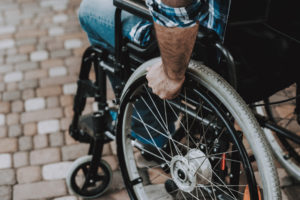
Process of a Personal Injury Claim
1. Injury Stage.
All personal injury claims begin with a life-changing event – a physical hurt caused by someone else’s negligence.
A personal injury is a physical injury caused by someone else’s carelessness. In the legal world, “negligence” just means carelessness. I don’t like using the word accident because “accident” implies that an injury could not have been prevented. When we speak of a personal injury, we are really talking about an injury that could have been prevented by taking the appropriate level of care.
Very often injuries from negligent car crashes include broken bones, traumatic brain injuries, injuries to internal organs, neck and back injuries, burns, lacerations, amputations, and death. Sometimes the injuries are less severe, such as concussions, strains, sprains, and whiplash.
If you have experienced any of these injuries because of negligence, you have a personal injury claim, and the person who caused it should be held responsible to fix whatever can be fixed. Usually, the only way to fix things in any part is by paying money. That’s where the insurance company comes in.
The basic rule of driving a motor vehicle is this: pay attention to the road at all times – otherwise you are likely to injure people. In car crash cases, some of the very common ways that people are careless on the roads are by being distracted. Distracted driving is one of the leading causes of car crashes in Vermont.
 Distracted driving often involves drivers using a cell phone for calls or texting or interacting with other devices such as GPS or maps. But other things can cause unnecessary distraction as well, such as eating or drinking while driving, or interacting with children in unnecessary ways. Some drivers even have animals like dogs in the front seat with them which is another form of distracted driving.
Distracted driving often involves drivers using a cell phone for calls or texting or interacting with other devices such as GPS or maps. But other things can cause unnecessary distraction as well, such as eating or drinking while driving, or interacting with children in unnecessary ways. Some drivers even have animals like dogs in the front seat with them which is another form of distracted driving.
Some of the accidents that can be caused by distracted driving include broken bones, traumatic brain injuries, damaged organs, and of course spinal injuries in the neck and back. Other injuries include burns lacerations, amputations, and death. If you have suffered from one of these types of injuries, the basic rule of negligence is that you have a personal injury claim, and the person who caused those injuries is responsible to do everything possible to make it better.
Most of the time, when we’re talking about “making it better” we’re talking about paying money to compensate you for pain and suffering, lost wages during your recovery, medical bills, and associated expenses, and the basic loss of parts of your life (lost enjoyment of life damages).
Another frequent cause of personal injuries is drunk driving. People who are intoxicated by drugs or alcohol are obviously very risky drivers and what they’re risking is the safety and lives of other people. Drivers who are intoxicated with alcohol or high on drugs are less able to focus on the dangers of the road and often don’t even see other cars, pedestrians, or bicyclists and cause serious injuries when they rash. Strangely, people who are intoxicated – particularly with alcohol – often walk away from crashes without significant injuries themselves because their bodies tend to be relaxed by the alcohol.
Another common cause of personal injury is speeding. Speeding drivers cause many injuries and deaths every year in Vermont. There’s a reason why the state of Vermont and Vermont towns and counties (including Bennington, Rutland, and Addison) post speed limits on the roads.
Obviously, a car going too fast can’t stop soon enough to prevent injuries and deaths when the driver hits another car, a pedestrian, a bicycle, or some other object. In most cases where a driver is speeding at the time of the crash, that driver is going to be responsible for all of the injuries and other harms that flow from the crash.
 Another frequent cause of negligent injuries is overtired driving. Sometimes, drivers fall asleep or nod off at the wheel and that’s another form of careless driving that can cause personal injuries. We often see overtired driving cases with truck drivers who have been on the road for too long people. But it can also happen when drivers have been up too late the night before or people who are trying to drive long distances without stopping.
Another frequent cause of negligent injuries is overtired driving. Sometimes, drivers fall asleep or nod off at the wheel and that’s another form of careless driving that can cause personal injuries. We often see overtired driving cases with truck drivers who have been on the road for too long people. But it can also happen when drivers have been up too late the night before or people who are trying to drive long distances without stopping.
Overtired drivers can easily fall asleep momentarily at the wheel, then cross the centerline and hit oncoming traffic or fail to stop or yield at an intersection. Drivers who fall asleep at the wheel because of carelessness will be responsible for whatever injuries they cause.
After an injury on the road caused by someone’s carelessness, you have two jobs: get medical treatment, and speak with an experienced injury lawyer. Do both as soon as possible.
- Your job at the injury stage: move to safety, call 911.
- Your personal injury lawyer’s job at the injury stage: have a plan in place to resolve your claim.
- What the insurance company will try to do: convince you to make a written statement, convince you to settle quickly for a small amount.
2. Initial Medical Treatment Stage.
 Immediately after an accident, it’s important to get medical attention right away. Everyone who is involved in a car crash should get a medical checkup as soon as possible – preferably immediately. Of course, many people are taken to the emergency room directly by ambulance, car, or helicopter, and that’s because their injuries are obvious.
Immediately after an accident, it’s important to get medical attention right away. Everyone who is involved in a car crash should get a medical checkup as soon as possible – preferably immediately. Of course, many people are taken to the emergency room directly by ambulance, car, or helicopter, and that’s because their injuries are obvious.
The obvious injuries are things like broken bones, external bleeding, amputated limbs, and unconsciousness. However, many people who are injured in car accidents don’t have hurts that are immediately obvious. The non-obvious kinds of injuries are often traumatic brain injuries, psychological injuries, emotional harm, and internal injuries. A frequent injury that is usually not obvious is called whiplash.
Whiplash injuries are caused by stretching to the ligaments and muscles in the neck and back. Very often in the immediate aftermath of a car crash, drivers and passengers have so much adrenaline in their system they might not know that they’ve been injured at all. That’s why it’s so important to get to a doctor right away.
When you are at an initial visit with a medical provider after a car crash, it’s important to explain everything that happened to you in as much detail as possible. Obviously, this is important for the doctor to choose the right treatment for you. But it is also important for your personal injury claim.
If possible, get a copy of the doctor’s notes from your very first meeting with the doctor. You should try to get a copy of the doctor’s notes to make sure the doctor includes a description of all the injuries you’ve reported. It’s important that the injuries are documented because it’s difficult to prove that injuries were caused by a car accident if they aren’t noted in the initial doctor visit record.
 If possible, you should work with your doctor’s office to make sure that all of your concerns are in that first note. Then, as treatment continues, it’s important to consider all of the treatment options available to you, including treating with your regular physician, working with a chiropractor, working with physical therapy, and working with other types of treatments. All of these treatments are going to be important for resolving your personal injury claims.
If possible, you should work with your doctor’s office to make sure that all of your concerns are in that first note. Then, as treatment continues, it’s important to consider all of the treatment options available to you, including treating with your regular physician, working with a chiropractor, working with physical therapy, and working with other types of treatments. All of these treatments are going to be important for resolving your personal injury claims.
- Your job at the initial medical treatment stage: get medical treatment, explain what happened and every injury in detail.
- Your personal injury lawyer’s job at the initial medical treatment stage: help you get the treatment that you need.
- What the insurance company will try to do: tell you it won’t pay for treatment, even when it has to.
3. Investigation Stage.
After getting initial medical treatment, your next job is to hire a lawyer. Of course, you’re not going to have to pay your lawyer anything initially, so you don’t have to worry about that. A good personal injury lawyer will get paid at the end of the case out of your settlement money. In Vermont, you always have the option of paying your lawyer an hourly fee as you go.
Most people don’t choose this option because it can be very expensive upfront and most people don’t have a lot of money after getting in a car crash. So, most victims of personal injuries choose the contingency fee option. A “contingency fee” just means the lawyer gets paid when the lawyer wins the case. “Winning the case” can mean either settling the insurance claim or winning a verdict at trial. Most lawyers in Vermont work on a 1/3 contingency fee.
Choosing your lawyer is an important and difficult job. In an ideal world, you would be able to get several opinions from other lawyers about what lawyer would be best for you. Of course, we don’t live in an ideal world and so it’s not always possible to get those kinds of referrals. At Larson & Gallivan Law, we promise to send you to the best lawyer for you – even if that lawyer isn’t us. That’s one way to know that you have a good lawyer!
Other things to look for include: positive reviews on Google My Business, Yelp or Avvo, and Justia (legal referral websites). Often people in your circle will know someone they trust and, although it can feel awkward to ask for a referral to a lawyer, it’s a good idea to get a reference from people in your community, church, or other religious community, school, or workplace.
- Your job at the investigation stage: get referrals to choose an experienced, honest lawyer.
- Your personal injury lawyer’s job at the investigation stage: explain to you what makes them the right choice – or refer you to the lawyer who is the better choice for you.
- What the insurance company will try to do at the investigation stage: convince you to settle your claim before you hire a lawyer.
4. Medical Treatment and Insurance Management Stage.
 After initial medical treatment, most people injured in a car crash require ongoing treatment. That treatment might be at a hospital, or with a primary care doctor, a mental health practitioner, or with chiropractic physical therapy or other treatment providers.
After initial medical treatment, most people injured in a car crash require ongoing treatment. That treatment might be at a hospital, or with a primary care doctor, a mental health practitioner, or with chiropractic physical therapy or other treatment providers.
There are a couple of things to keep in mind during this phase of your case. It’s very important to get all of the treatment you need to heal from your injuries and any treatment that might help at all. Don’t skip doctor appointments. If a doctor recommends a particular treatment, get that treatment. If a doctor refers you to a specialist, see that specialist. Unfortunately, getting all the treatment you need might be something of a full-time job for you or your spouse or another caregiver.
You do want a lawyer who can help with this stage of your personal injury claim. You want a lawyer who can help manage insurance companies and payments to medical care providers, as well as medical record reviews. If you’ve been badly injured, you may have bills that are paid by Medicare or Medicaid, private health insurance, your own car insurance, medical payments coverage, and the other car’s liability insurance.
Different providers and even different bills might be paid by different insurances. In fact, sometimes no insurance has paid a bill, and you might not even know it. Keeping track of all of these payments and making sure that your bills are getting paid can be a huge job. It’s a job that your lawyer ought to be handling for you. Sometimes, medical treatment and insurance management is the biggest job your lawyer will do in your case. This is critical to settling your claim — and it’s also a critical part of making sure that you get the care you need to heal. If your lawyer isn’t helping you with this part of your case, find another lawyer.
In most cases, you will have hired a lawyer for your personal injury claim while your medical treatment is ongoing. During this time, your lawyer should be following your treatment, gathering your medical records, speaking with your doctors if appropriate, checking in with you periodically, and — most importantly – making sure that your bills are getting paid appropriately.
 Sometimes if a medical bill doesn’t get paid by the correct insurance company, you might get a bill from a provider that should be going to insurance instead. Sometimes these bills can be in the hundreds of thousands of dollars. Make sure that doesn’t happen to you by hiring a lawyer who’s taking care of this part of your case.
Sometimes if a medical bill doesn’t get paid by the correct insurance company, you might get a bill from a provider that should be going to insurance instead. Sometimes these bills can be in the hundreds of thousands of dollars. Make sure that doesn’t happen to you by hiring a lawyer who’s taking care of this part of your case.
Eventually, you’ll come to the end of your ongoing medical treatment. We call this a “medical endpoint” in your personal injury claim. A medical endpoint just means that there’s no known medical care that needs to happen in the future, or that although you need ongoing care into the foreseeable future the scope of that care is identified. When you’ve reached the medical endpoint it’s time for the next phase of your case.
5. Demand Package Stage.
Once you’ve reached a medical endpoint it’ll be time for your lawyer to prepare a demand package to send to the insurance company. The demand package is basically an extensive letter describing what happened to you and arguing why it’s a personal injury claim. It will include the legal reasons why the other person is responsible for the injury and will set out in detail what your damages are.
We call it a demand package because included with this letter will be medical summaries, medical bills, expert reports, and other documents designed to show why your personal injury claim is more valuable than the insurance company believes it to be. At the end of the demand, the package will be the demand. The demand is just an amount of money that you are willing to accept in compensation for your damages.
 Your lawyer will help you determine what the demand amount will be. The demand amount should always be more than you and your lawyer expect the insurance company to pay. That’s because the demand package opens a period of negotiation during which your lawyer (in consultation with you) and the insurance company about an amount of money for a settlement. The amount of your settlement will depend on many factors – the most significant one being how extensive was your medical treatment in most cases.
Your lawyer will help you determine what the demand amount will be. The demand amount should always be more than you and your lawyer expect the insurance company to pay. That’s because the demand package opens a period of negotiation during which your lawyer (in consultation with you) and the insurance company about an amount of money for a settlement. The amount of your settlement will depend on many factors – the most significant one being how extensive was your medical treatment in most cases.
Usually, the insurance company will respond by calling your lawyer with a counteroffer that is lower than you expect. Sometimes, it is much lower. Hopefully, however, your lawyer expects the lowball offer and can help you walk through the negotiation. There are usually several rounds of offers and counteroffers – this is haggling, a bit like an auction.
If you and your lawyer decide that you have the best offer the insurance adjuster is going to make, and it makes sense to accept this offer, the case settles at this point. You and the insurance company have arrived at an amount that you would accept and the insurance company is willing to pay. You will not have to file a lawsuit and can go directly to the settlement phase of your claim.
- Your job at the demand package stage: be realistic about what insurance money is available and work with your lawyer to develop a plan of action for filing a lawsuit if the insurance adjuster does not make a reasonable offer.
- Your personal injury lawyer’s job at the demand package stage: make the best case possible for all of the insurance money you can get, then help you decide whether to settle or not. Meanwhile, help you understand the options if you don’t reach a settlement, including a trial strategy. Your lawyer must also only make offers you approve of, and keep you informed of the moving parts of the negotiation.
- What the insurance company will try to do at the demand package stage: make lowball offers, tell you why you’ll lose your case, convince you to settle for less money than is actually available.
6. File a lawsuit.
 If your claim does not settle during the demand package phase, then you will need to file a lawsuit. To file a lawsuit your lawyer will write a document called a complaint that sets out the reasons why your case is a personal injury claim including why the other person was negligent in causing your harm. This document gets filed in the court and served on the defendant.
If your claim does not settle during the demand package phase, then you will need to file a lawsuit. To file a lawsuit your lawyer will write a document called a complaint that sets out the reasons why your case is a personal injury claim including why the other person was negligent in causing your harm. This document gets filed in the court and served on the defendant.
The defendant is usually the other driver or the other driver’s company. The defendant will then file an answer in court and there may be other motions documents and arguments that are technical and formal now that the formal legal process has started. Most of this work will be done by your lawyer who will keep you informed but shouldn’t require a lot of effort on your part.
- Your job at the lawsuit stage: help your lawyer by reviewing the facts in the complaint.
- Your personal injury lawyer’s job at the lawsuit stage: make sure the lawsuit includes the necessary elements of your claim in the complaint, file within the deadlines (statutes of limitations) written into the law, make sure the defendant is served (usually by the sheriff).
- What the insurance company will try to do at the lawsuit stage: the insurance company’s only job at this stage is to hire a lawyer for the defendant.
7. Discovery
 After a lawsuit is filed, you’ll enter a phase called discovery. In this phase, you and the defendant will exchange documents and other evidence to prepare for trial. There are two important parts of this phase that you’ll be required to work on: your deposition and interrogatories.
After a lawsuit is filed, you’ll enter a phase called discovery. In this phase, you and the defendant will exchange documents and other evidence to prepare for trial. There are two important parts of this phase that you’ll be required to work on: your deposition and interrogatories.
Your deposition will be on interview under oath with your lawyer, the insurance company lawyer, and possibly a representative from the insurance company itself – the insurance adjuster. You’ll be asked questions about the crash, your driving history, your criminal history, personal details about your life, and many questions about your medical treatment.
It might feel like you’re the one on trial! But that’s just part of the process – the defendant gets to ask you questions about your life to find out if there’s anything that would make your damages less harmful to you. For example, you may have had other injuries earlier in life that have that could have caused some of the harms that you’re complaining of.
Of course, that’s what the insurance company wants to show! Your lawyer should work with you carefully before the deposition to prepare you to answer questions in the best light possible for your case. You should get at least one practice deposition with your lawyer before the real one.
Before or after your deposition you’ll also be required to work on answers to interrogatories. Interrogatories are formal questions asked by the lawyer on the other side, along with requests for documents. These documents will mostly include medical records, which your lawyer should have handled for you. But there will be other documents to put together – tax returns, correspondence and such.
 Every case is different when it comes to the evidence the parties want during the discovery phase. Usually, answering these interrogatories is about as hard as filing your own taxes. You and your lawyer should be able to do this in a day in most car accident cases. Of course, your lawyer is going to do the same things on the other side: depose the defendant and any other witnesses and send interrogatories and other discovery requests to the defendant.
Every case is different when it comes to the evidence the parties want during the discovery phase. Usually, answering these interrogatories is about as hard as filing your own taxes. You and your lawyer should be able to do this in a day in most car accident cases. Of course, your lawyer is going to do the same things on the other side: depose the defendant and any other witnesses and send interrogatories and other discovery requests to the defendant.
The idea throughout this part of the case is to develop the evidence that will be shown to the jury at trial. Another thing that may happen in this stage is more one or more experts might be hired to help you win your case.
- Your job at the discovery stage: help your lawyer answer discovery questions and prepare for your deposition.
- Your personal injury lawyer’s job at the discovery stage: make sure that the evidence needed to win your case at trial is developed through witnesses, documents, and expert testimony.
- What the insurance company will try to do at the lawsuit stage: block your requests for information, humiliate you by asking you as many personal questions as possible.
8. Mediation
 When the discovery phase of your personal injury claim is complete, it’s time for mediation. Mediation is a formal process for negotiating an agreement with the insurance company and the defendant on a settlement amount. This is really a continuation of the demand package phase. This time, your lawyer, the insurance company lawyer, the insurance adjuster, you, and the defendant get together in a room with a formal mediator to try to find an amount that the insurance company would pay to cover your damages.
When the discovery phase of your personal injury claim is complete, it’s time for mediation. Mediation is a formal process for negotiating an agreement with the insurance company and the defendant on a settlement amount. This is really a continuation of the demand package phase. This time, your lawyer, the insurance company lawyer, the insurance adjuster, you, and the defendant get together in a room with a formal mediator to try to find an amount that the insurance company would pay to cover your damages.
The mediator is usually a professional negotiator or a retired judge. The hope is that this process arrives had some result that is better for you than the risk of going to trial. Of course, a trial is risky because in every single case because you could lose, and even if you win, it’s hard to know how much compensation a jury would award for damages. If a settlement is successful at this phase, you will avoid the trial and appeal phases of your claim and go straight to settlement.
Your lawyer will probably ask you to make an opening statement in the mediation – and if you have a good lawyer, will work with you on preparing for it. All of these tasks build on each other, though. Your work together preparing the demand package and preparing for your deposition will be repurposed and worked into a short statement of your harms. Usually, the mediator will then separate the parties and move back and forth between rooms (or Zoom rooms) to see if a settlement is possible.
- Your job at the mediation stage: make a statement at the beginning, and work with your lawyer on the negotiation.
- Your personal injury lawyer’s job at the mediation stage: convince the mediator to push the insurance company as hard as possible to make a higher offer.
- What the insurance company will try to do at the mediation stage: convince you and your lawyer that you will lose if you go to trial, so you ought to accept a smaller settlement.
9. Trial.
 Almost no cases go to trial. Trials only happen if no settlement can be reached at the demand package or mediation stage. Usually, a trial happens at least a year after the lawsuit has been filed, so if you’ve gotten to this point your personal injury claim has been ongoing for a long time – perhaps several years.
Almost no cases go to trial. Trials only happen if no settlement can be reached at the demand package or mediation stage. Usually, a trial happens at least a year after the lawsuit has been filed, so if you’ve gotten to this point your personal injury claim has been ongoing for a long time – perhaps several years.
At trial, you and your lawyer will present your story to a jury. The story you will show with as much detail and color as possible will be how your life after the crash is different from your life before. It’s also about why the defendant is responsible for that change. You will have a jury of up to twelve people who will decide if the defendant is responsible and, if so, how much your damages are. The jury will come up with an amount of money that the jury believes is equivalent to the harms and damages you have experienced. In some cases, juries decide that the harms are worth zero. That’s why it’s important to settle your case if you can.
A trial is an enormous amount of work, both for you and especially for your lawyer. I compare preparing for trial to writing a book. There are many chapters of evidence to develop. There are witnesses and characters and background to your story. There is an infinite number of ways that it could be presented, and your lawyer’s job is to present it in the best light possible.
At Larson & Gallivan Law we think there are two bottom lines to the experience of trial. The first goal, of course, is to get as much money as possible into your pocket so that you can rise up from the damage of your injury and get on with your life. The second goal of telling your story at trial is to help you process it internally. It can be important for victims of negligence injuries and criminal actions to describe what happened to them and what they’ve done to rise above it.
- Your job at the trial stage: be present and engaged in the trial. Tell the truth.
- Your personal injury lawyer’s job at the trial stage: present your story to your jury in the most compelling way possible. Help you tell your story in a way that benefits your claim and your sense of autonomy.
- What the insurance company will try to do at the mediation stage: try to convince the jury you are lying.
10. Appeal
After a jury trial, there is sometimes an appeal. The appeal goes to the Supreme Court of Vermont and claims some error in the jury trial that caused the jury’s verdict to be incorrect. Appeals are highly technical, and we will not go into them here. Suffice it to say that approximately 2% of insurance claims go on to an appeal.
- Your job at the appeal stage: review the documents written by your lawyer for factual accuracy.
- Your personal injury lawyer’s job at the appeal stage: legal research, writing, and argument to the Vermont Supreme Court.
- What the insurance company will try to do at the mediation stage: try to block the appeal through their lawyers.
11. Settlement
 The settlement phase of your trial happens after the insurance company agrees to pay an amount that you will accept or after the jury awards a verdict that is not appealed. You might think that once an insurance company agrees to pay an amount of money your case would be done. However, there are several important jobs for your lawyer to do at the settlement stage.
The settlement phase of your trial happens after the insurance company agrees to pay an amount that you will accept or after the jury awards a verdict that is not appealed. You might think that once an insurance company agrees to pay an amount of money your case would be done. However, there are several important jobs for your lawyer to do at the settlement stage.
One of the biggest jobs is to figure out all of the medical bills that need to be paid out of the settlement amount. Often, different insurance companies have paid for your treatment, or Medicare or Medicaid have paid for some treatment. Sometimes there are outstanding medical bills that haven’t been paid at all.
If the Veterans’ Administration has paid for some of your care, or if you’ve been treated at VA hospitals or offices, there are additional complications for your legal team to handle for you. You need to make sure that all of these bills, liens, and subrogation amounts are taken care of. If you (or your lawyer) don’t do this correctly, you could get a very bad surprise in the form of a giant bill from a hospital or insurance company down the road. Sometimes these bills are in the hundreds of thousands of dollars. You’ve probably heard of people who face bankruptcy after settling a personal injury claim. The reason is that the liens and other bills that should have been taken care of were not.
 At the settlement stage, you will also sign a settlement and release document. The release is a document where you agree to accept the settlement money and either dismiss your lawsuit or forgo the right to file it at all. It usually includes other terms as well, for example, that you keep the terms of the settlement confidential.
At the settlement stage, you will also sign a settlement and release document. The release is a document where you agree to accept the settlement money and either dismiss your lawsuit or forgo the right to file it at all. It usually includes other terms as well, for example, that you keep the terms of the settlement confidential.
Your lawyer should do a lot of work in many cases to hammer out what this agreement says so that you don’t fall into a trap down the road set for you by the insurance company. Finally, when the bills, expenses, and the lawyer fees have been paid, the lawyer will give you a check for your portion of the settlement amount. At that point, you can deposit the check and you’re finally done with your personal injury claim.
- Your job at the settlement stage: sign documents and deposit your check.
- Your personal injury lawyer’s job at the settlement stage: make sure your right to your money is protected by handling and negotiating the liens and subrogation amounts for your medical bills.
- What the insurance company will try to do at the mediation stage: get you to agree to certain terms that aren’t helpful to you.
Call Our Vermont Personal Injury Lawyer Today
If you’ve been seriously injured, our Vermont personal injury law firm is here to provide you support, guidance, and representation as you seek damages. Please call us today for a free consultation. We can begin working on your case immediately.
